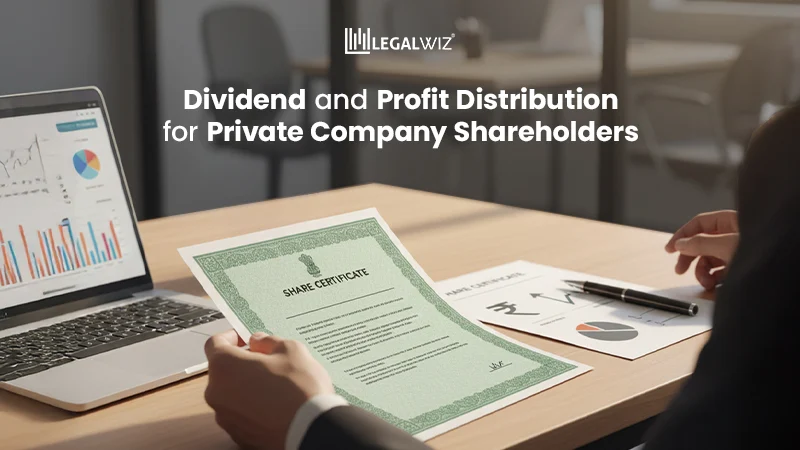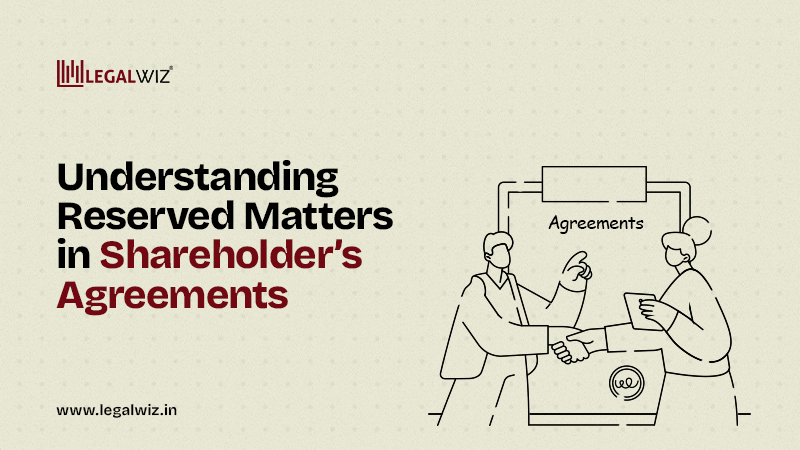Key Clauses to Include in your Shareholders’ Agreement
Bringing investors on-board your business venture is surely exciting and promising. It paves new paths for growth and expansion. However, you will also need to draft a detailed and definitive shareholders’ agreement when you sit across the table with your investors.
The importance and key clauses of a shareholders’ agreement
This agreement clearly defines the relationship between the different shareholders with their rights and commitments in the Company’s management. Therefore, it is a key document which should align with the Articles of Association. When the start-ups invite funding, the investors wish to document the agreed-upon terms and protect their interests. While the investors have their advocate’s support to protect their interests, you, as a start-up founder should also familiarize yourself with the most essential clauses of shareholders’ agreement in India.
Here’s how you can protect your interests with these six must-have clauses!
Participation in Critical Decisions
While a few investors would come in the organisation with technical expertise, others may be interested in just the numbers. Although such dormant investors give free hand to founders to manage their Company, they do take part in critical decisions of the Company. The role of the investors must be clearly defined in the agreement. It should ideally list the events and circumstances under which the investor’s in-principle approval will be required. Such decisions would cover appointment or removal of directors or CXO, expansion of the business line, or issuing more shares, or capital expenditure etc. The manner of participation should also be clearly defined. Some investors appoint their nominees to Board and others may have written consent policy. A few decisions can be time sensitive, so you should develop a mechanism for quick approvals or consultations.
Pre-emptive Rights and Anti-dilution
Equity stake and ownership go hand-in-hand. The founders and investors, both desire to keep their holding unchanged. Pre-emptive rights clause requires the Company to first offer the new shares to the existing shareholders in proportion to their present shareholding. This clause is effective when all the existing shareholders are willing to invest further. When the Company is offering new shares to new investors, anti-dilution clause plays a crucial role. An anti-dilution clause in your startup Shareholders’ Agreement will enable the investors to keep their holding unchanged without further investing. That is if an investor has present holding of 10% at 1 Cr capital and the new investor is bringing in additional 5%, the present investor will automatically be allotted with 0.5% to keep their ownership/ voting unchanged. As a founder, you should be cautious while giving away anti-dilution clauses as it may dilute your stake in the Company.
Right of First Refusal
This protective clause for the shareholders restricts the transfer of shares. With increased number of shareholders/ investors, you may lose the control or influence over the Company. Transfer of shares can be one method to increase the number of shareholders without further issue. This clause ensures that the company’s control is not transferred to undesirable third parties. A shareholder willing to transfer their shares has to first offer the same to other existing shareholders at the same price. Usually, the offer prices are derived from an independent valuer. If the existing shareholder is not willing to purchase the shares at given price, then the Company may find another investor. This way, the shareholders will have control over who they are doing business with.
Drag-Along and Tag-Along Rights
When the majority of the shareholders wish to sell their holding, the minority group suffers by being in business with unwanted co-owners. The tag-along rights protect the minority’s interest in such events. Also known as piggyback rights, this allows the minority shareholders to sell their holding at the same price and terms, if they so choose. While tag-along rights give the power to minority, drag-along rights are favourable to the buyer. Drag along rights forces the minority shareholders to be dragged for company’s sale at the same price and terms. This ensures that the buyer can received 100% of the shares.
Exit or Termination Clause
This shareholders’ agreement clause deals with what happens when a shareholder leaves the Company under different circumstances. Upon achieving important milestones, the founders tend to offer buy out or the investors wish to exit from the business. If such milestones are predefined, this clause provides the manner of exit by the investors or even for the founders. Often, the shareholders take exit at fair value or with guaranteed premium on the acquisition.
Often referred as bad leavers, are the shareholders who breach the material obligation, or do not achieve important milestones set out in the agreement initially. The parties may have this clause tailor-made based on the material obligations on each party. The defaulting party has to generally offer the shares to Company or other existing shareholders at discounted price.
Dispute Resolution
The shareholders generally attempt to resolve a dispute amicably. A dispute resolution clause is the last resort but it is preferable to a deadlock which may cause serious injuries to the business operations. Your shareholders’ agreement should set out a process to resolve the dispute between the shareholders; or shareholders and the Company. Mediation or out of court settlements are preferable methods to avoid being trapped into litigations.
Get it done by the Professionals!
Of course, you’ll need professional legal help to draft shareholders’ agreement for your startup. When done perfectly, it will reduce the uncertainty in case difference of opinion arises. Our team here at LegalWiz.in has been working with promising and trailblazing startups, providing them complete solution for everyday legal requirements. Ready for the ride ahead? Drop your details and we’ll connect with you soon!
Get Legal Assistance for Shareholders’ Agreement

Diksha Shastri
As a writer, Diksha aims to make complex legal subjects easier to comprehend for all. As a Lawyer, she assists startups with their legal and IPR drafting requirements. To understand and further spread awareness about the startup ecosystem is her motto.







